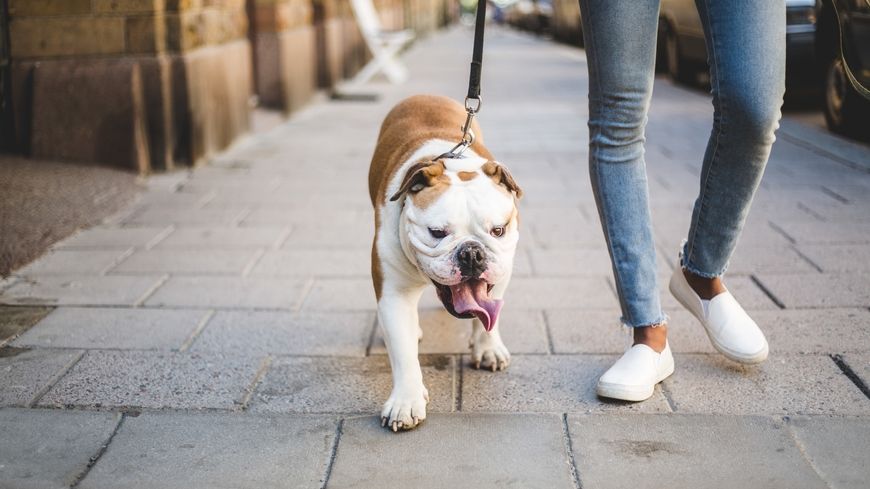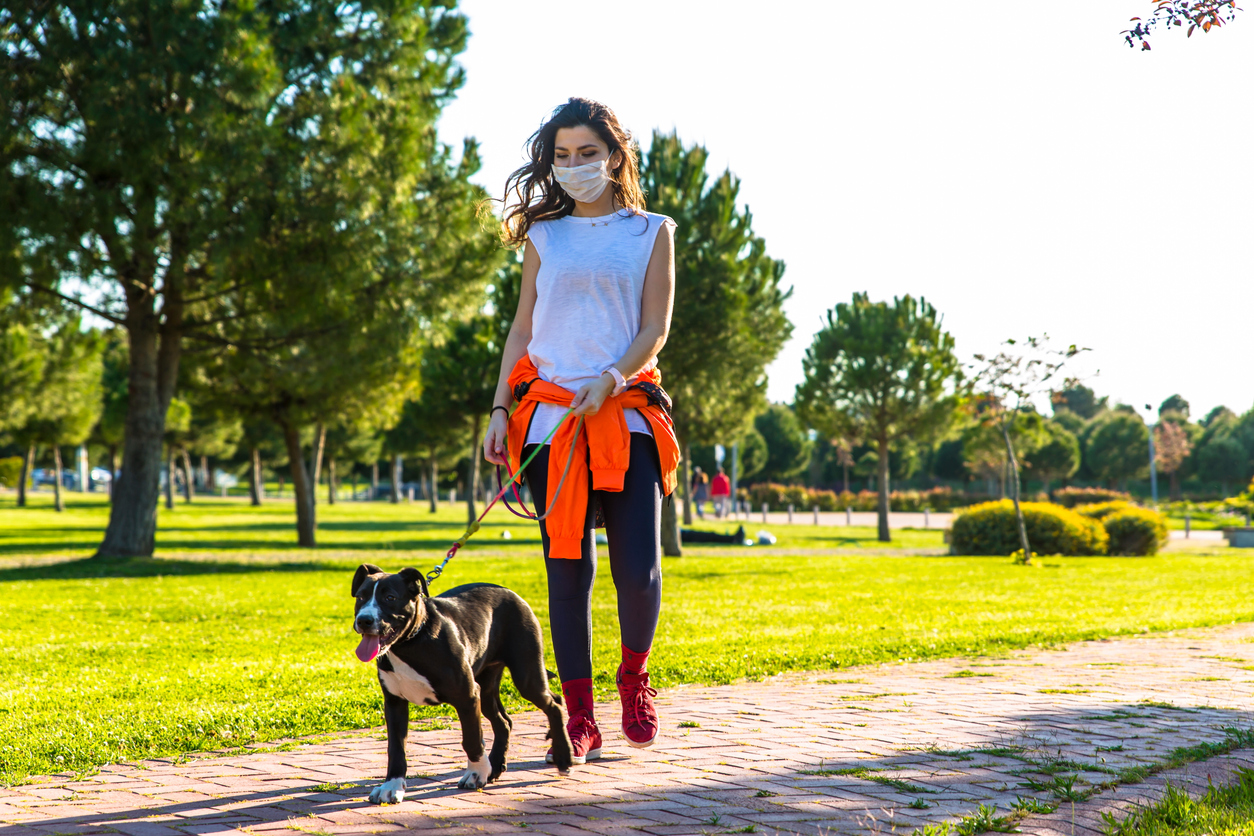How many times a day should i walk my dog
Before adopting a dog, you must be sure that you can offer him everything he needs to remain happy and in good mental and physical health. One of the hardest things to quantify is time, as a dog needs the attention of its owner first and foremost, and he or she must be willing to devote several hours a day to it.
Among all the moments necessary for a healthy lifestyle for a dog are walks, activities that are as time consuming for the owner as they are fulfilling for the dog. To ensure a minimum of well-being for your faithful companion, you must anticipate his need for daily outings, which will depend on his age, his breed, his health, but also his temperament.
Why walk your dog?
Walking your dog is essential not only for his health and happiness, but also to allow him to relieve himself.
Physical health
From a physical health point of view, going out allows the dog to exercise, that is to say to maintain its muscles, its joints, its heart and its lungs. This prevents him from aging prematurely, but also from putting on too much weight, a recurrent problem in sedentary animals that is the cause of many diseases. There are many dog sports and hobbies that you can explore depending on your taste for sports and the breed of your dog.
Mental Health
For the most athletic dogs, which is to say for about all breeds that do not belong to group 9, exercise is essential to burn off excess energy and to maintain good mental health. Lively and athletic dogs that do not have the opportunity to let off steam by running, playing with other dogs or exploring their environment tend to turn their frustration into stress and develop deviant behaviors.
We immediately think of Greyhounds, Huskies, Sheepdogs (Border Collie, German Shepherd), but Terriers and Hunting dogs (Labrador, Spaniels, Golden Retrievers) also need to expend a lot of energy to remain balanced. Pleasure dogs (Poodle, Bichon, Pekingese, etc.) are less athletic, but they are not fragile dogs that do not like walks, and even long hikes.
One forgets willingly that behind their beautiful fur, these small doggies were also working dogs and are not much more fragile than Dobermans: they also need exercise and will love to let off steam as much as the big dogs. Finally, all the dogs, sporting or not, need to evolve in a stimulating environment in order to exercise their sense of smell and their intellect.
If this aspect of the outings is often neglected by the owners, it is in fact crucial for the well-being of the dogs. It is therefore important to let your faithful companion sniff the smells he meets on his way during walks and not to rush him or pull on his leash to take him faster to a dog park or other place where you think he will be happier.
In fact, a one-hour walk doesn't have to be three kilometers long: 500 meters can be enough if your faithful companion has preferred to hang out rather than run.
Socialization
Outings are an opportunity for your dog to meet other humans, to be confronted with a new environment, but also, and especially, to meet other dogs. We must not neglect the importance of socialization for your dog, an essential step to allow him to develop a balanced behavior, but also to learn to control himself and to behave well in front of his fellow dogs.
In addition to making your pet feel better about itself, socialization will make your life much easier if you ever have to give your dog to a dog-sitter, board him, take him to a friend's house who also has a pet, or adopt a second dog, cat or rabbit. Put the emphasis on this aspect of your dog's education from an early age: let him meet other dogs, play with them and even be "reprimanded" by his peers, so that he learns to measure his actions and interact well with his peers.
Natural needs
Finally, going out is essential for your dog to relieve himself naturally, unless he has access to a garden at all times. This last point should not be neglected: in addition to the small incidents that are not very pleasant for the owner to clean up, a dog that holds back from urinating for too long can develop serious kidney and urinary system problems.

How often should I walk my dog?
The frequency of outings varies according to each specimen, but we can generally state that a daily walk of thirty minutes, in addition to the hygienic outings, is the strict minimum to respect to keep a dog happy and healthy.
This will not be enough for an energetic, athletic dog, and may be too long for an old dog suffering from arthritis. In the end, you must adopt a rhythm of outings carefully adapted to your dog, and nothing prevents you from making shorter outings during the week (minimum 30 minutes) and going for walks of several hours on the weekend.
Frequency of toileting
If your dog doesn't have access to a garden at all times to relieve himself when he wants to, he is obliged to hold back between two outings, which is not very pleasant and can even cause him pain. Generally, an adult dog is able to hold himself between 4 and 5 hours, even more when he sleeps, up to a maximum of 8 hours.
It is therefore necessary to let him out a minimum of 4 times a day, otherwise he may either hold back too much, which is dangerous for his body, or he may not succeed in holding back before the next outing. Puppies, on the other hand, are not able to hold back as long as adults: they must be taken out every 1 to 2 hours, and immediately after each meal.
How often should a puppy be walked?
The frequency of outings for puppies should ideally be more frequent than for adult dogs, for several reasons. First of all, you should count on about 8 to 10 hygiene outings per day, because a puppy can't hold it in as long as an adult and must have the opportunity to relieve itself outside as soon as it feels like it in order to properly learn how to clean itself.
Only then will he make the connection between going out and doing his business, and will eventually get into the habit of waiting until he is outside to eliminate. Moreover, a puppy must be able to spend all his energy to be tired when he comes home, this being essential so that he can sleep during your absences and learn not to dread moments of loneliness.
Finally, it is during his young age that you must socialize the puppy to allow him to develop a balanced behavior. The more frequent the outings, the more he will have the opportunity to meet other animals, other humans and various situations to which it is good to get him used (public transport, car noise, etc.).

How often does a sporting dog go out?
Very athletic dogs need to let off steam to channel their energy and enjoy enough distractions to avoid boredom.
During or in addition to the 4 hygienic outings, you should plan at least 1 or even 2 one-hour walks during which he can run and play with his owner and/or other dogs.
Hunting dogs (Golden Retrievers, Labradors, Beagles, Spaniels...) also have a great appetite for olfactory stimulation and will be happier to go for a walk in places where they will have the opportunity to follow tracks or smell various odors.
How often to walk an old or sick dog
Tired, frail or sick dogs may have difficulty getting around, and owners often make the decision to only take them out for their hygiene needs. In reality, it is important for their mental health to continue to get fresh air and exercise their sense of smell.
A daily walk of at least 30 minutes, in addition to or during a sanitary outing, is therefore still indicated, except in the case of injury or serious illness requiring complete rest. Take the time to walk your old dog or your convalescent pet at a pace that suits him and let him stop as soon as he wants and take all the time he wants to sniff smells that intrigue him.
FAQ
How many times a day should my dog go outside to relieve himself?
An adult dog can hold it's own for 4 to 5 hours during the day and up to 8 hours when it sleeps, so you should take it out at least 4 times a day. A puppy can only hold it's own for 1 to 2 hours when it's not sleeping, so plan on 8 to 10 toileting trips per day.
How many times a day should I walk my dog?
It is important to walk your dog at least once a day, and I am talking about a real walk of at least 30 minutes for the most sedentary dogs, and at least 1 hour for the sportsmen.
How long should I take my dog out each day?
A hygienic outing should last at least 10 minutes to give your dog time to settle in, and a walk at least 30 minutes for less athletic dogs. Therefore, count at least 1 hour of outing per day for your dog, even 2 hours for sporty or energetic dogs.
Why do I need to walk my dog?
In addition to taking your dog outside to relieve himself at least 4 times a day, it is crucial to allow him to go for a walk to get some exercise and to stay physically and mentally fit. There's no accounting for love, as the old saying goes, and this applies very well to the daily outings you need to give your pooch to keep him happy and healthy.
In fact, if there is a minimum number of outings per day to offer him a healthy lifestyle, there is no maximum, and the more you walk your dog, the happier and fitter he will be!
For busy owners who lack the time to take their faithful companion out for long periods before and after work, the emphasis should be on long weekend walks.
Loving and educating your pet also means protecting it against the hazards of life. This is why we strongly recommend that you take out health insurance as soon as possible. This will save you astronomical veterinary fees in case of accident or illness.


